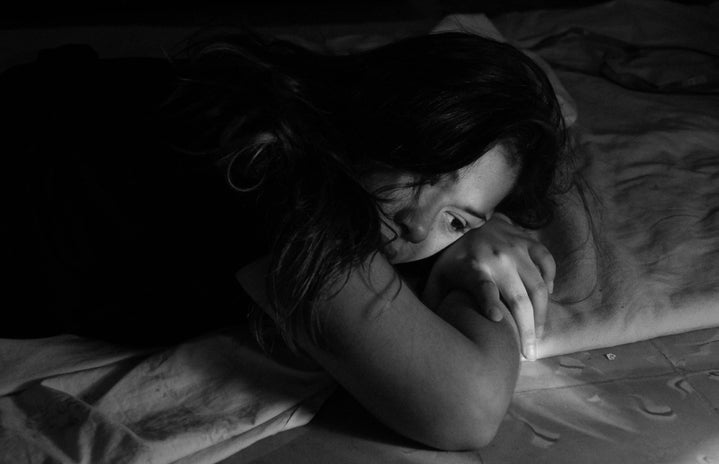I have always struggled with anxiety and tasks requiring focus. I was raised by my parents to be very academically oriented, but the pressure that came with my expectations for myself became far greater than that which came with anyone else’s expectations for me. As a kid, I lacked social interaction; most of my time was spent trapped in my mind. I neglected to think of it as a prison and instead regarded it as a fantasy land, where I could trade a demanding reality for a fictional universe filled with other peoples’ stories. (I did not see my own life as interesting nor worthy of being retold.) I spent nights laying awake. I worried nonstop about things that had no business in my brain, like what would happen when I died; I harbored a distinct paranoia about someone breaking into our house and went so far as to alternate between facing the door and the window; I agonized over whether I was reaching certain milestones fast enough: learning how to shave, getting my period, having my first kiss, having sex for the first time.
My quiet and unassuming nature amongst my peers led to cruel comments and assumptions. They insinuated that because I was high-achieving, I was somehow gifted and thought I was better than them. Because I kept to myself, I didn’t know about the raunchier things they boasted of and had little personality. Their baseless commentary festered in my head. It made me unsure of who I was. It made me want to stay trapped. I constantly wondered how I was perceived by others but feared that even if I found and showed myself, there would be no changing their minds. I dreamed more than I ever did of having a friend, of being more than a face, of laughing comfortably and feeling like I belonged in places where I always felt misunderstood.
The incessant and rampant racing of my thoughts continued to have a profound effect on me through school; it took me hours to study a book chapter that likely took my classmates minutes to retain. I was easily distracted, quickly overwhelmed and struggled with indecision. I was obsessive about even small tasks and couldn’t quit until they were done perfectly. I was told I took too long and was too slow. It hurt because I was trying my best. I could tell it frustrated people, but didn’t know anything was wrong with me nor how to express it if I did. I blamed myself for the irritation my anxiety caused others. I beat myself up over the smallest things in private, chastising myself for not being “normal” and for failing to live up to the impossible standards I’d fashioned for myself.
Growing up, I was led to believe that this experience was no different from that of anyone else. It wasn’t until I reached college that I realized these challenges were not faced by everyone. I had become so accustomed to feeling lonely that I no longer wanted friends. I was scared that, regardless of who I chose to be, someone would decide to see something they didn’t like and send me rocketing back into the life I had before. It was only when I started being myself that I even began realizing who I was—and that people could like that person. I made friends and opened up. My understanding of reality grew deeper (though perhaps not more organized nor easier to control). Realizing that the mental challenges I faced were real shocked me but made me feel validated. Now that I knew there were problems—however perpetually a part of me and minutely unfixable—I could finally articulate them and begin creating a bountiful life around them. I no longer saw myself as weak, but as far stronger.
It’s easy to let anxiety consume your identity. While it remains a daily struggle, I’ve combatted it by becoming a version of myself I can be proud of. Forming rock-solid values and performing your genuine personality can prevent you from losing sense of yourself, even when your mind is racing. I can now compartmentalize my thoughts in some ways, rely on the strong foundation of the identity I’ve built for myself and recognize during these episodes that many of my intrusive thoughts are baseless.
Never be ashamed to ask for help. A lot of the time, facing the constant challenges of anxiety makes it a million times harder to get through even a normal day. It can begin to feel like you are carrying this endless and unforgiving weight all by yourself. You don’t have to be alone. It is extremely helpful to have at least one person who knows your struggle and, in rougher times, can remind you of what’s real. You’re not a burden for attempting to decompress the things that fight to control you every day. I endured most of my childhood anxiety without knowing what it was or how to control it, and thinking I was just overly incompetent. I bore the weight alone for so long, thinking that was how it had to be. When I finally found people who cared to understand and offered me a shoulder to lean on, I realized that I didn’t have to do it all by myself all the time. I still have to remind myself that it’s okay to find solace in others and take the hand lent to me, but I’m getting better at it.
Lastly, be conscious of the people you care about who may be suffering from anxiety. Just because someone’s struggle is invisible to you does not mean they aren’t struggling. Just because they are working and going to school (and even performing well at these things) does not mean they aren’t struggling. Oftentimes, they feel like they don’t have a choice. They think they have to hide how they’re feeling. Let them know they don’t have to pretend to be okay. Be patient. Pain isn’t always visible on the surface.



